Pinterest is one of the most misunderstood and underestimated marketing platforms on the internet.
If you thought that Pinterest was just for collecting recipes or wedding ideas, or that it’s not a profitable marketing platform, I’m here to tell you that you are very wrong!
Let me share a few interesting statistics with you:
If you’re still not convinced, check out this comparison of the time it takes for content shared on these popular social networks to receive approximately half their engagement that they will ever receive:
This means content shared on Pinterest will continue to gain exposure for days, weeks and months after you first post it.
So how have we missed such a huge marketing opportunity?
When people think of Pinterest, they often assume it’s only useful for certain topics or creative busi-nesses. But if you explore the categories and use the search features, you’ll find thousands of Pins on almost any topic you can think of.
Like most people, I signed up for Pinterest back when I first heard about it years ago. I collected interesting recipes, handy cleaning hacks, dream home ideas, and pretty pictures, but I didn’t do much more from there. A few years later, I would use it to collect new ideas for my blog or to find tutorials, but I still never imagined that I could use it as a part of my own marketing strategy.
I assumed that Pinterest was mostly about luck. I assumed that “going viral” on Pinterest was the same as going viral on Youtube – some people just get lucky. In fact, one of my own blog posts on my first ever website had been shared on Pinterest over 60,000 times, and yet I still didn’t understand how to create that kind of momentum without just being lucky.
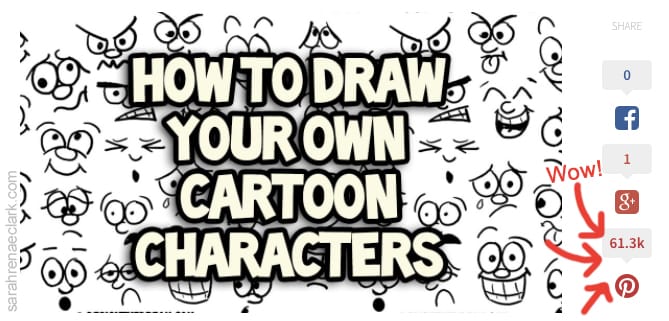
Boy, was I wrong!
I started making my own coloring books in late 2015, and by late 2016 I finally started to see that Pinterest could have a positive impact on my business if I learned how to use it correctly.
I started doing a LOT of research on Pinterest marketing and immediately started implementing the strategies I discovered.
In just over two months, I had achieved the same viral effect on two new blog posts, each reaching over 10,000 repins. In comparison, they were shared on Facebook less than 200 times each, even though I’d spent over a year building my Facebook audience.
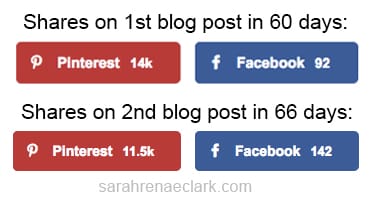
Before we dive into my Pinterest Marketing series of blog posts, I want to clear up some common Pinterest marketing myths and misconceptions that you may have heard, and show you how a simple mindset change can impact your entire approach to Pinterest marketing.
So let’s set the record straight and tell you why the following 10 Pinterest mindsets are WRONG.
- Pinterest is a social media network
- I need a lot of fans to benefit from Pinterest
- Pinterest is only good for ideas, not for shopping
- Pinterest only works for certain niches
- My business isn’t ready for Pinterest
- I will lose my audience if I share content from others
- I will annoy my fans if I save Pins too often
- I don’t have time to manage another social media network
- I don’t have enough content for Pinterest
- #Hashtags don’t work on Pinterest (Good news – they now do!)
Let me explain why each of these Pinterest mindsets are wrong:
Disclaimer: This post contains affiliate links and I may earn a commission if you click them and make a purchase. This is at no cost to you and I only recommend products that I love.
[thrive_2step id=’54582′]
 [/thrive_2step]
[/thrive_2step]

Wrong Pinterest Mindset #1: Pinterest is a social media network
Correct Pinterest Mindset: Pinterest is a visual search engine
Saying that Pinterest isn’t a social media platform isn’t entirely correct. It still requires you to connect with followers, post regular content, follow other users and create networks.
However, if you approach Pinterest marketing in the same way that you approach Facebook or Instagram, you won’t be reaping the full benefits of what it can do for your business.
Pinterest is unlike any other major social media platform because it acts like a visual search engine for people to collect ideas, wish lists, goals and information. People come to Pinterest to be inspired, not to find out the latest news or what their friends are doing.
You might pin a free printable for Christmas 2016 and gain some momentum, but unlike Facebook or Instagram, that momentum will continue into future Christmas’s through the use of keywords, search features and good Pinterest SEO. Every time someone repins your content, it’s shown to more and more people and can be added to hundreds of personal “wish lists” and boards year after year, creating a viral reach that is impossible with Facebook or Instagram.
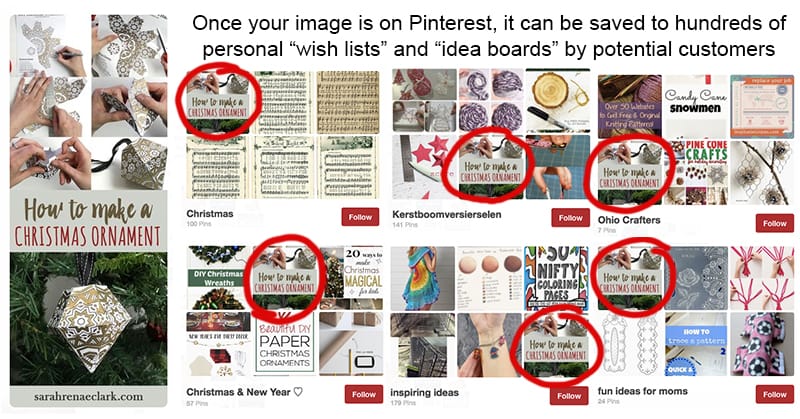
I love this, because it takes the pressure off having to get a huge amount of likes when you first post something to Pinterest. It can sometimes take months or years, but eventually your website can reach a huge crowd if you’ve put the effort into producing quality content and “pinnable” pictures.

Wrong Pinterest Mindset #2: I need a lot of fans to benefit from Pinterest
Correct Pinterest Mindset: I can see a huge increase in blog traffic with just a few fans
As I mentioned earlier, I was lucky that one of my old blog posts had been repinned over 50k times on Pinterest. In my case, it WAS luck, but in my first few months on Pinterest, with less than 1,000 followers, I was able to achieve more results over 10k in just a few months.
In my next few blog posts I’ll show you how to optimize your profile and get your first 1,000 Pinterest followers, but it’s important to note that a small following is no reason you can’t succeed right now and start seeing a significant increase in your blog traffic.
Here’s a look at my Pinterest analytics from 1st December 2016 to 20th February 2017. I started working on my specific Pinterest Marketing strategies about mid December:
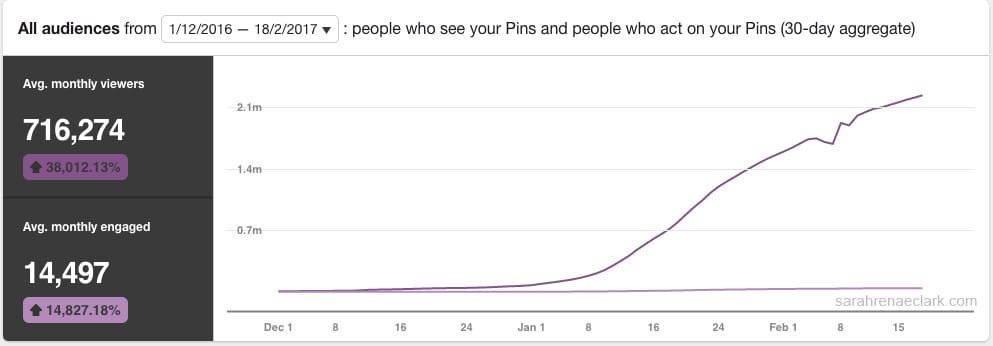
And check out my top traffic source on Google Analytics in February 2017:
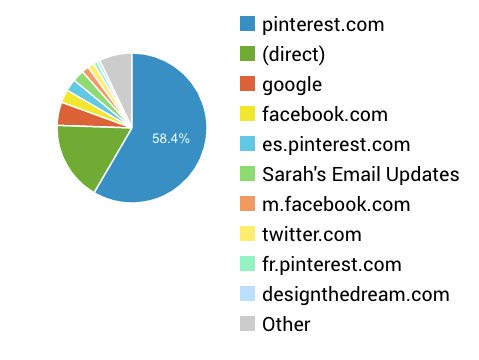
At the start of December 2016, I had just under 300 Pinterest followers. 2 months later, I grew my following to over 1,500. It’s still a very small following compared to many on Pinterest, so you can see how your results don’t necessarily require a huge audience.
All it takes is for the right person to see your post, repin it, and you can reach thousands of people through the wonderful snow-ball viral effect that can occur over time.
One of the best ways to increase your initial reach to build that momentum is to be a part of some quality group boards that already have larger fan bases. I explain this in more detail in my post about growing your own fan base.

Wrong Pinterest Mindset #3: Pinterest is only good for ideas, not for shopping
Correct Pinterest Mindset: People don’t just go to Pinterest to browse, they go to buy
According to Pinterest’s Business page, 2 million people save product Pins every day.
Pinterest teamed up with Shopify (a commerce platform with over 160,000 stores) to determine how effective Pinterest marketing is for Shopify stores. According to Shopify:
- Pinterest is the second largest source of traffic to Shopify stores
- On average, Pinners spend $50 per order—this is higher than orders that come from Facebook and Twitter
- 87% of respondents in a Pinterest survey said Pinterest helped them decide what to purchase.
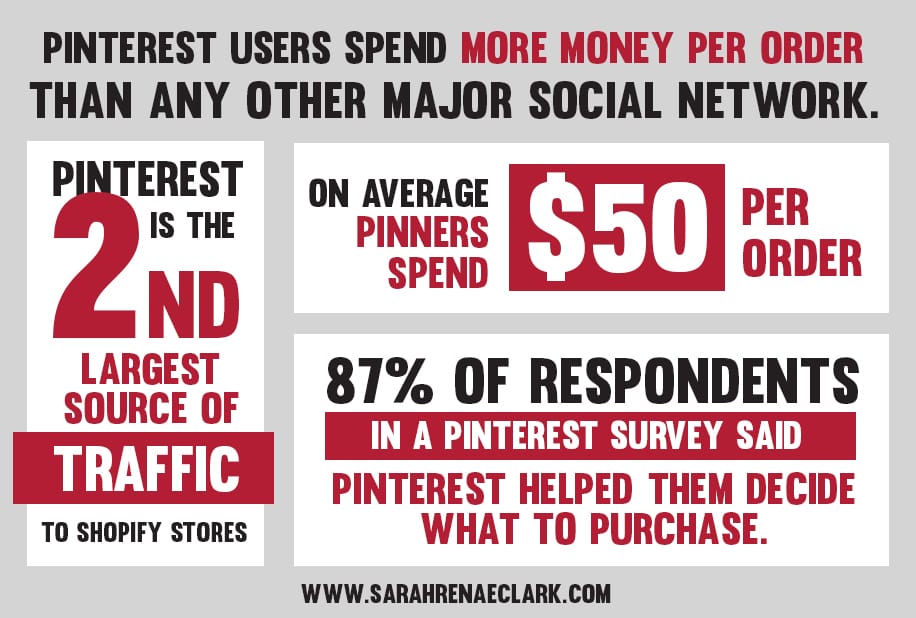
Need I say more?
[thrive_2step id=’54582′]
 [/thrive_2step]
[/thrive_2step]

Wrong Pinterest Mindset #4: Pinterest only works for certain niches
Correct Pinterest Mindset: Pinterest can work for any niche
It’s a common assumption that Pinterest is only good for promoting recipes, DIY projects, weddings or dream homes. While these categories are popular, you can make Pinterest work for ANY niche.
Let’s take a quick look at the other categories in Pinterest’s main menu:
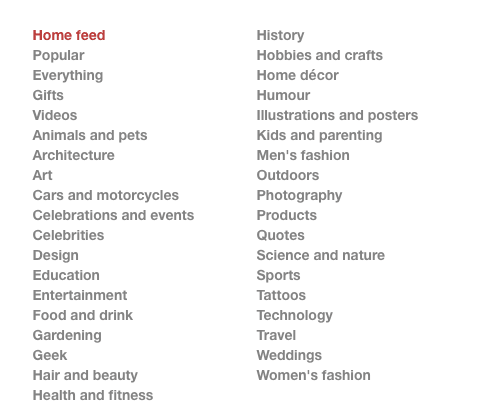
A look at what people are searching for on Pinterest’s blog provides even more insight into the level of variety of the content and audience on Pinterest.
The top 10 searches in the United States in 2015 included Harry Potter, Iceland, pallet projects, lob hair, men’s fashion, bathroom storage, small tattoos, vegan recipes, Alice in Wonderland and scandinavian interiors.
Take a look at Japan, France, Brazil, UK and Germany and you get some even stranger niches, including detox water, cheese fondue, lifehacks, sewing patterns, street art, woodwork, braids, Men’s bracelets, Dr Who crafts, crafting with kids, Filofax, racing bikes and winter gardens.
If you want to see the potential of your niche, do a quick search and see what kind of results you find and whether they have a high repin count.

Wrong Pinterest Mindset #5: My business isn’t ready for Pinterest
Correct Pinterest Mindset: Starting Pinterest now can give your business a head start
Many people hold off on Pinterest until they feel like their website is ready, their blog posts are perfect and they have everything organized. The reality is that day may never come!
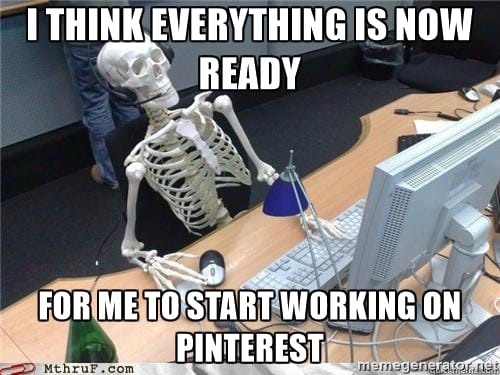
When I started to optimize my Pinterest profile and focus on building my following, my blog only had two or three posts that I considered to be “Pin-worthy” and I didn’t even have good pictures for those.
So instead, I started pinning content from other people that appealed to my audience. As a result, my audience started to grow rapidly. When I finally pinned one of my own products, it was easy to get repins because I’d already built the momentum and Pinterest considered my content to be valuable, so more people saw it.
Which brings me to my next mindset… the fear of sending traffic to your competition!

Wrong Pinterest Mindset #6: I will lose my audience if I share content from others
Correct Pinterest Mindset: I will provide more value to my audience if I share content from others
People often make the mistake of only pinning their own stuff. I’ve done it too! But changing my mindset on this has helped me to grow my audience more than anything.
Here’s 8 reasons why you should pin content from other people on Pinterest:
- It takes the pressure off producing all the content yourself
- It allows you to teach your audience things that are out of your own skill set
- It comes across “spammy” if you only pin your own stuff
- You become a more valuable resource in general, which will draw a bigger crowd
- You will show up in “also pinned by” results at the bottom of popular Pins
- People will spend more time browsing your boards if it’s not just a huge sales pitch
- You’re more likely to find people willing to collaborate and repin your content
- It’s just good Pinterest etiquette!
I think a great rule is the 80/20 rule: Pin 80% from other people’s content and only 20% of your own content. Don’t worry if you don’t have enough content yet to pin 20% of your own.


Wrong Pinterest Mindset #7: I will annoy my fans if I save Pins too often
Correct Pinterest Mindset: Successful Pinners save at least 15-30 Pins per day
As we’ve already covered, Pinterest isn’t like other social media networks. While the recommended number of posts per day for most social media platforms is between one to three posts, many successful Pinterest marketers recommend pinning between 15-30 times a day.
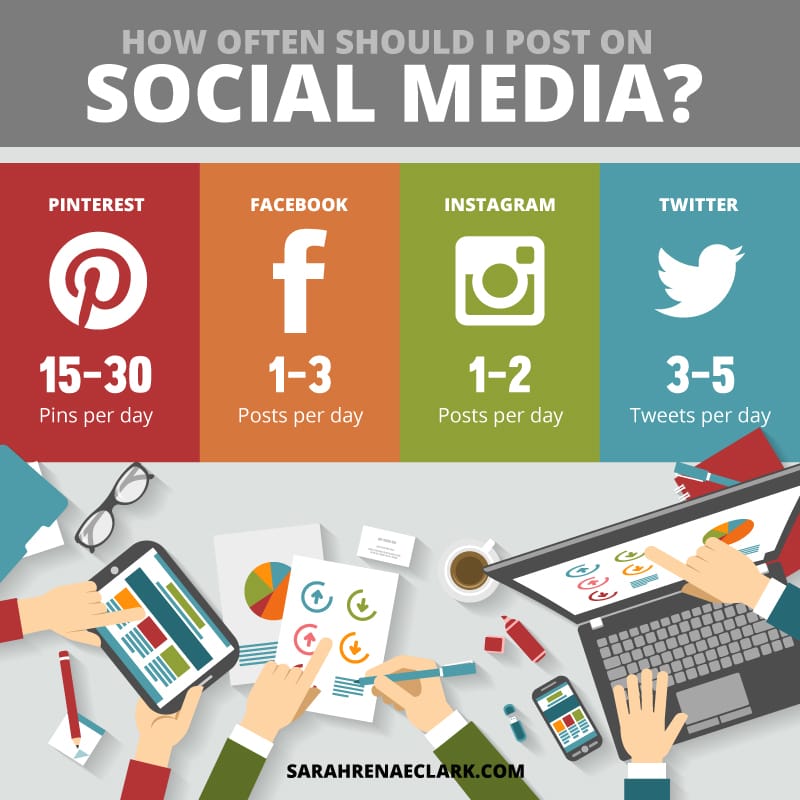
15-30 Pins a day sounds crazy, right? But before you skip this section, don’t worry – you can actually achieve this without committing too much time by using Tailwind, which is a Pinterest scheduling tool. When I first started, I spent a few days scheduling Pins through Tailwind’s free trial and was able to schedule 15 Pins a day for the following two months without opening Pinterest.
Pinterest has a “Smart feed” that determines what your followers will see. So instead of your Pins being shown chronologically, they are ranked in order of estimated quality.
The Pins you see on your home feed are a compilation of the most relevant and popular content from the accounts you follow, the keywords you use and content that is related to the Pins you have saved previously.
This is why it’s important to optimize your profile using keywords and save quality Pins on a consistent basis.
[thrive_2step id=’54582′]
 [/thrive_2step]
[/thrive_2step]

Wrong Pinterest Mindset #8: I don’t have time to manage another social media network
Correct Pinterest Mindset: You can manage your Pinterest account in about an hour per week
This mindset is probably the main reason why I didn’t start marketing on Pinterest 6 months earlier. I knew it would be beneficial, but I just didn’t have the time. I even considered hiring my Mom to do it for me (with no previous experience), because I had no idea how important it actually was.
Once I started optimizing my profile and making Pinterest a priority, I still didn’t spend as much time on it as what I thought I would need to.
It took me less than a week to optimize my Pinterest profile, start implementing a few basic strategies to build my Pinterest followers and start seeing results.
It doesn’t have to be perfect straight away. Just working on a few of the steps in my guide on how to optimize your Pinterest profile will give you a head start, even if you’re not ready to commit solid time to building your account now.
Once you’ve set up your profile, you can schedule Pins through Tailwind to automate your workload and save a LOT of time.
Tailwind has been the biggest part of my Pinterest strategy and has probably been the best investment I’ve made in my business in 2017. They offer 100 free Pins when you sign up for the free trial, so you can give your Pinterest profile a great boost when you’re starting out.

Wrong Pinterest Mindset #9: I don’t have enough content for Pinterest
Correct Pinterest Mindset: You don’t need much content to attract traffic from Pinterest
Remember the 80/20 rule I mentioned earlier? You don’t need a lot of content of your own when you first start pinning, as long as you pin quality content from other sources.
If you’ve got two to three blog posts, you can create Pinnable content for them, such as infographics, tall images, or even just a title image. I usually create two to three different title images for my blog posts and schedule them to pin to multiple boards over time using Tailwind.
One blog post > 2-3 title images > 6-7 boards > 20+ opportunities for your blog post to be seen on Pinterest
I use Photoshop to make my images, but you can also use a free program such as Picmonkey or Canva that are easy to use.

Wrong Pinterest Mindset #10: #Hashtags don’t work on Pinterest
Correct Pinterest Mindset: Keywords are important, but #hashtags now work too!
When I first published this blog post, this point was actually “hashtags don’t work on Pinterest” – but Pinterest has now changed their algorithms (as all platforms do) and so now our strategies can change to include hashtags.
But there’s an important consideration in the fact that hashtags haven’t been included on Pinterest for so long. As we’ve already covered, Pinterest is a search engine, not a social media platform, so we should rely on strong keywords more than we rely on hashtags.
Pinterest is set up into categories and interests. People search for keywords, and you want to show up in their results. While hashtags will now open up a new method for people to search on Pinterest, remember that hashtags are limited to exact spelling and don’t allow for variations of keywords.
For example, in my case of selling adult coloring books, I use the keywords “adult coloring books”. If someone does a search for “coloring books” or “colouring books” or even “coloring for adults” then I’m far more likely to show up in their results than if I used the hashtag #adultcoloring, which will only show up if they search for that exact term.
Pinterest also makes recommendations to users on similar keywords, so a search for “adult coloring” will bring up suggestions like “adult coloring pages” and “adult coloring tips”.
So now that hashtags are in, think about adding them to your strategy (maybe you can create a brand hashtag or identify a few keywords to add to your Pins) but don’t go overboard. I would personally recommend adding no more than one to three hashtags in your descriptions.
According to Pinterest for Business, “having too many of them [hashtags] in your descriptions may negatively impact your ranking.”
Just like any platform, Pinterest will always reward users that provide quality content. While adding a lot of hashtags to your descriptions might help you to show up in searches now, be prepared that Pinterest will be looking for ways to keep hashtags authentic and will likely penalize you for going overboard or using them in a spammy way.
In Summary
Having the right mindset is the crucial first step to growing your business with Pinterest. Now, let’s move forward and start implementing a strong and achievable Pinterest marketing strategy.
I’ve created a series of blog posts in my Pinterest Marketing series to help you get started on Pinterest and develop a strong Pinterest Marketing strategy. Click one of the links below to start learning now:
Lesson 1: How to Optimize Your Pinterest Profile and Create an Account That Attracts Followers
Lesson 2: How to Find and Create Great Pins on Pinterest
Lesson 3: How to Optimize Your Website for Pinterest and Increase Your Traffic
Lesson 4: How to Get Your First 1000 Followers on Pinterest (Quickly!)
Don’t forget to Save this post for later and share it with your friends!
This article is an excerpt from my Pinterest marketing guide The Pinfluence Playbook.
In The Pinfluence Playbook, I’ll show you how I grew my website traffic from 16,000 to 57,000 monthly pageviews in just ONE month and what I do now to maintain a steady growth in about an hour per week.
“This guide has helped me to understand not only HOW to use Pinterest but WHY. I’ve read similar articles on this topic, but never so in-depth and never conveniently all in one place. Running my own business, I didn’t think I’d have the time to do all the of work involved for Pinterest, until now.
Just by following the first couple steps in this guide, the views on my business website have already increased by 92% in one week. I can’t wait to complete the rest of the steps and see how my business improves!” – Cristin April Frey, Cristin April’s Art
Click here to find out more and start growing your traffic!
[thrive_2step id=’54582′]
 [/thrive_2step]
[/thrive_2step]


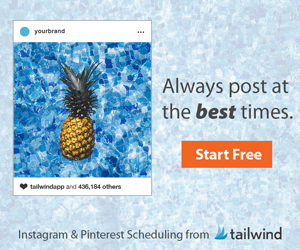




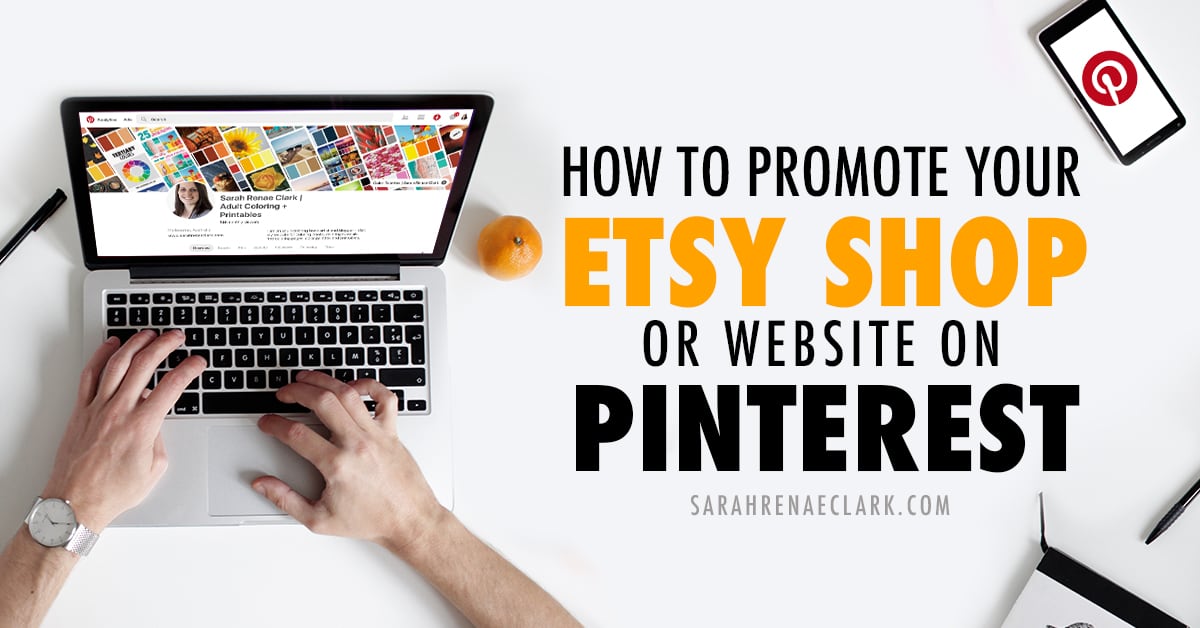




Wow this is one of the best post I see on Pinterest. I am just getting started on the platform and this post really shed some light. That a lot for the clarity.
Thank you Casey!
Thanks for these tips! I’m trying to focus more on Pinterest and will definitely read the rest of your series!
Thanks Olivia! Let me know how you go :)
Wow! I’m blown away by this amazing article! Thanks for this awesome content that is so readily applicable! My blog is fairly new and I’ve just surpassed 100 followers starting from 0, but the progress seems so slow compared to the amount of effort I’m pouring into my Pinterest account. I went through all of your articles on this series and aill definitely start to implement some of your suggestions. Thanks!!
Thanks Briana! 100 followers is a great start… The first few hundred will always be the hardest and it WILL get easier from there. Let me know how it goes for you after you’ve started implementing some of these ideas! You’ll find that you spend less time on Pinterest when you can set up a proper strategy from the start, so starting now will definitely help you down the track.
This is a great post, very informative! Thanks for sharing. Ill definitely be using these tips
Thanks Merryl! I’m glad you found it useful